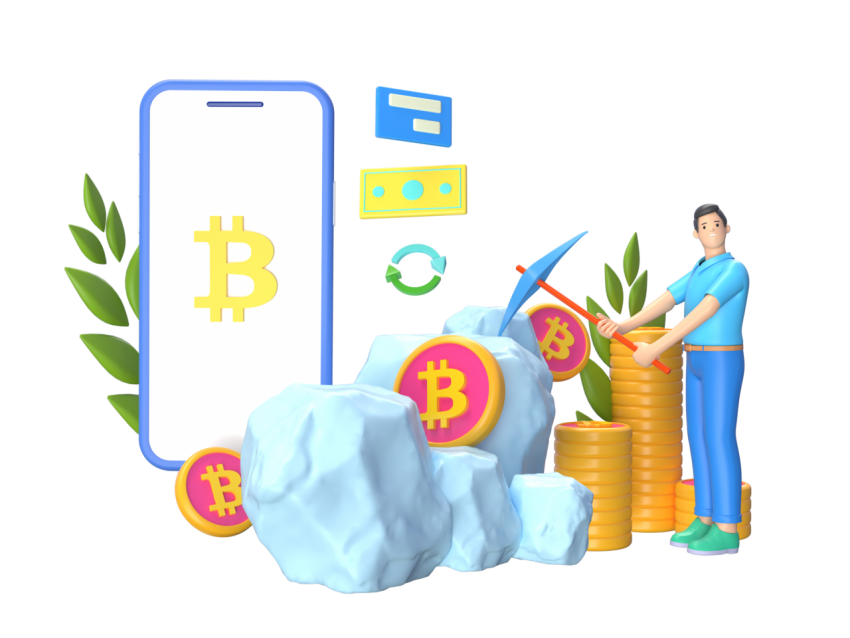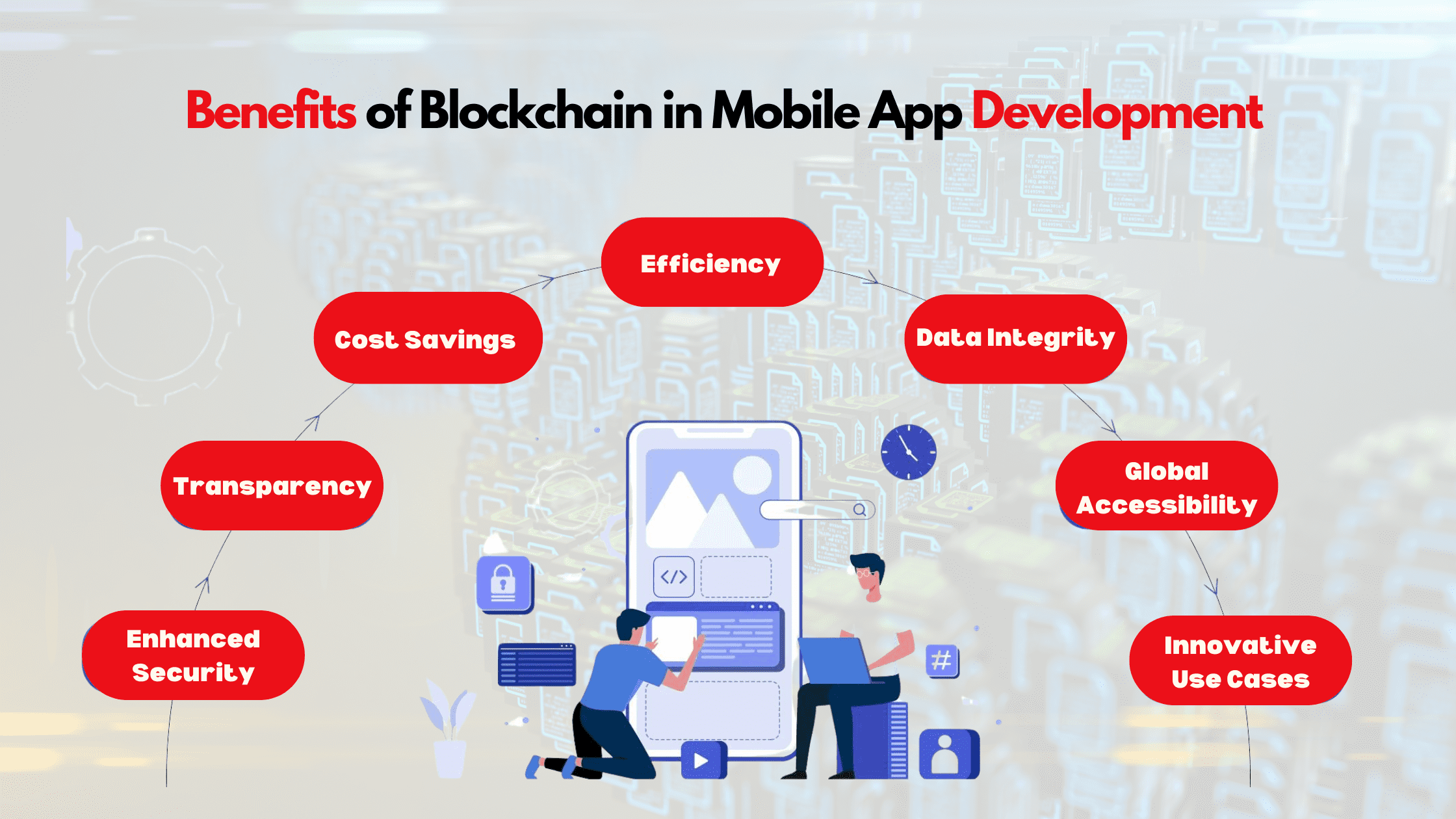Mobile applications have become integral to our daily lives in today’s digital era. Mobile apps have revolutionized how we interact with technology, from communication to shopping, entertainment to banking. With the rise of mobile app usage, there’s also a growing demand for secure, transparent, and efficient solutions. This is where blockchain technology comes into play. In this article, we’ll explore role of blockchain in mobile app development, exploring its significance, benefits, and potential applications.
Why Use Blockchain Technology In Mobile App Development?
Blockchain technology, initially devised for Bitcoin, has evolved beyond cryptocurrencies to offer various applications across various industries. Its decentralized and immutable nature makes it an ideal solution for enhancing mobile application security, transparency, and trust.
One of the key reasons to integrate blockchain into mobile app development is security. Traditional centralized systems are vulnerable to cyber-attacks and data breaches. Mobile apps can ensure data integrity and prevent unauthorized access or tampering by leveraging the blockchain’s cryptographic algorithms and decentralized structure.
Moreover, blockchain facilitates transparent and auditable transactions. Every transaction recorded on the blockchain is immutable, meaning it cannot be altered or deleted once confirmed. This transparency fosters trust among users and eliminates the need for intermediaries, reducing transaction costs and processing times.
Another compelling reason to adopt blockchain in mobile app development is its ability to enable peer-to-peer transactions without intermediaries. This streamlines processes and eliminates third-party fees, making transactions more cost-effective and efficient.
Top reason your business needs the blockchain
How to Use Blockchain in Mobile App
Integrating blockchain into mobile app development requires careful planning and implementation. Here are some key steps to leverage blockchain technology effectively:
- Identify Use Case: Identify the specific use case for blockchain in your mobile app. Understanding the problem you’re solving is crucial, whether it’s secure payments, supply chain tracking, or identity verification.
- Choose the Right Platform: Select a blockchain platform that aligns with your app’s requirements. Consider factors such as scalability, security, and developer support when choosing between platforms like Ethereum, Hyperledger, or Corda.
- Design User Interface: Design a user-friendly interface that seamlessly integrates blockchain functionalities into your app. Ensure that users can intuitively interact with blockchain features without compromising the app’s usability.
- Implement Smart Contracts: Utilize smart contracts to automate and enforce business logic within your mobile app. Smart contracts enable self-executing agreements, eliminating the need for intermediaries and enhancing efficiency.
- Ensure Security: Prioritize security throughout the development process by implementing robust authentication mechanisms, encryption protocols, and auditing tools. Conduct thorough security audits to identify and address any vulnerabilities.
- Test and Iterate: Test your blockchain-enabled mobile app rigorously across various scenarios to ensure its functionality, performance, and security. Gather feedback from users and iterate on the app based on their input.
By following these steps, you can effectively leverage blockchain technology to enhance your mobile app’s security, transparency, and efficiency.
Role of Blockchain in Mobile App Development
Blockchain plays a pivotal role in mobile app development by offering a range of capabilities and benefits. Here’s how blockchain contributes to the development process:
- Security: Blockchain enhances the security of mobile apps by leveraging cryptographic algorithms and decentralized consensus mechanisms. By storing data on a distributed ledger, blockchain eliminates single points of failure and reduces the risk of cyber attacks and data breaches.
- Transparency: Blockchain promotes transparency by recording all transactions on an immutable ledger visible to all network participants. This transparency fosters trust among users and eliminates the need for intermediaries, leading to greater efficiency and cost savings.
- Decentralization: Blockchain enables peer-to-peer transactions without the need for intermediaries, thereby reducing dependency on centralized authorities. This decentralized approach empowers users with greater control over their data and assets, promoting inclusivity and democratization.
- Immutable Record-Keeping: Blockchain ensures the integrity and immutability of data by cryptographically linking each block to the previous one. This tamper-resistant nature of blockchain prevents unauthorized alterations or deletions, providing a reliable audit trail for mobile app transactions.
- Smart Contracts: Smart contracts are self-executing agreements programmed to enforce predefined conditions automatically. Mobile apps can automate processes, eliminate intermediaries, and facilitate secure, transparent transactions by leveraging smart contracts.
Overall, the role of blockchain in mobile app development is multifaceted, offering enhanced security, transparency, and efficiency across various use cases.
Benefits of Blockchain in Mobile App Development
The integration of blockchain technology brings forth a multitude of benefits for mobile app development. Some of the key advantages include:
- Enhanced Security: Blockchain’s cryptographic algorithms and decentralized architecture provide robust security measures, protecting sensitive data and transactions from unauthorized access or tampering.
- Transparency and Trust: By recording transactions on an immutable ledger visible to all participants, blockchain fosters transparency and trust among users, eliminating the need for intermediaries and promoting peer-to-peer interactions.
- Cost Savings: Blockchain eliminates the need for intermediaries, reducing transaction fees and processing times associated with traditional payment systems. This leads to significant cost savings for both businesses and users.
- Efficiency and Automation: Smart contracts enable automation of contract execution, eliminating manual processes and reducing the potential for errors or disputes. It enhances operational efficiency and streamlines business processes.
- Improved Data Integrity: Blockchain ensures the integrity and immutability of data by cryptographically linking each block to the previous one. It prevents data manipulation and provides a reliable audit trail for mobile app transactions.
- Global Accessibility: Blockchain operates on a decentralized network accessible to anyone with an internet connection, making mobile apps built on blockchain technology accessible to users worldwide without geographical restrictions.
- Innovative Use Cases: Blockchain opens up new possibilities for innovative use cases in mobile app development, such as decentralized finance (DeFi), non-fungible tokens (NFTs), and decentralized identity management.
By harnessing these benefits, businesses can gain a competitive edge in the mobile app market and deliver secure, transparent, and efficient solutions to their users.
Business Advantages of Blockchain in Mobile App Development
For businesses, integrating blockchain into mobile app development offers numerous strategic advantages:
- Competitive Differentiation: By offering blockchain-enabled mobile apps, businesses can differentiate themselves from competitors by providing enhanced security, transparency, and efficiency to their customers.
- Trust and Reputation: Blockchain fosters trust and transparency, enhancing the reputation of businesses prioritizing data security and integrity. This can lead to increased customer loyalty and brand trust.
- Cost Reduction: Blockchain eliminates intermediaries and reduces transaction fees associated with traditional payment systems, leading to cost savings for businesses and users alike.
- Market Expansion: Blockchain enables global accessibility, allowing businesses to reach a broader audience of users without geographical limitations. This opens up new market opportunities and revenue streams for businesses.
- Streamlined Processes: By automating processes with smart contracts, businesses can streamline operations, reduce administrative overhead, and improve overall efficiency.
- Regulatory Compliance: Blockchain’s transparent and auditable nature facilitates regulatory compliance, ensuring businesses adhere to data protection and financial regulations.
- Innovative Solutions: Blockchain technology enables businesses to explore innovative use cases and business models, such as tokenization, decentralized finance (DeFi), and supply chain transparency.
Overall, embracing blockchain mobile app development can position businesses for long-term success by enhancing security, transparency, and efficiency while driving innovation and market expansion.
Final Verdict
The role of blockchain in mobile app development cannot be overstated. From enhancing security and transparency to enabling peer-to-peer transactions and automating processes, blockchain technology offers many benefits for businesses and users alike. By integrating blockchain into mobile app development, companies can gain a competitive edge, build customer trust, and unlock new opportunities for innovation and growth. As the demand for secure and efficient mobile solutions continues to rise, leveraging blockchain technology will become increasingly essential for businesses seeking to thrive in the digital economy.
Why Should You Use Canadian Software Agency to Implement Blockchain for Mobile Apps?
Choosing the right software agency for blockchain integration in mobile apps is crucial. Canadian Software agency offer expertise in blockchain and mobile app development, proven by their track record. They innovate, ensuring regulatory compliance and prioritize collaborative partnerships. With rigorous quality assurance, partnering with a Canadian agency ensures successful blockchain integration for mobile apps.






